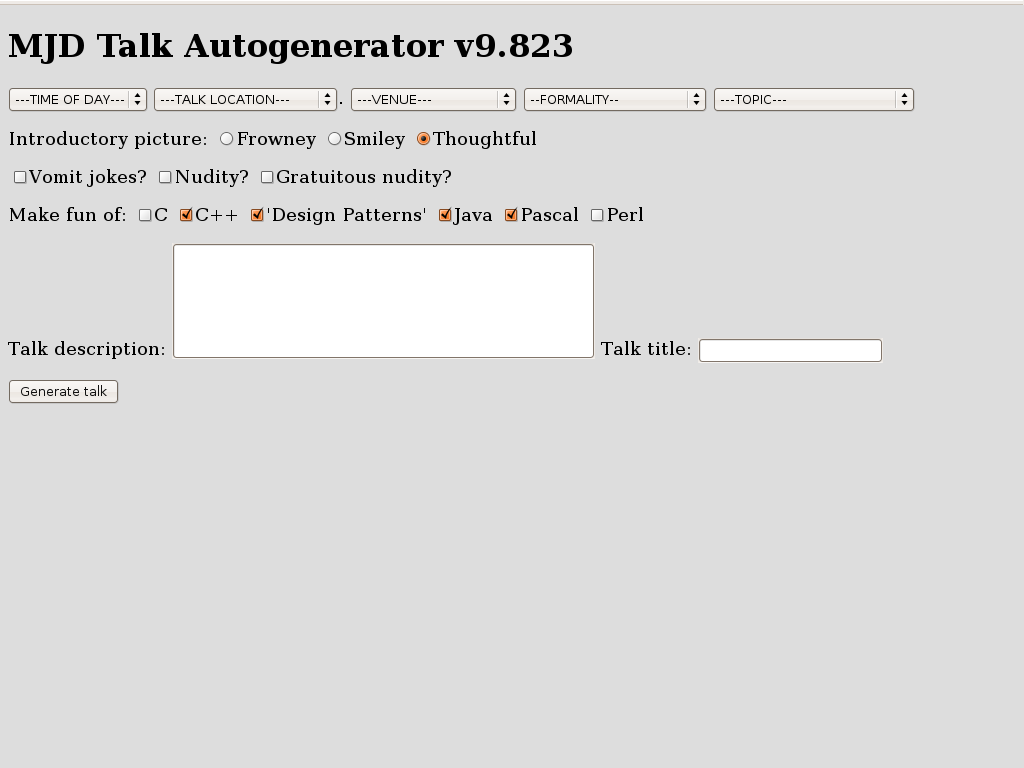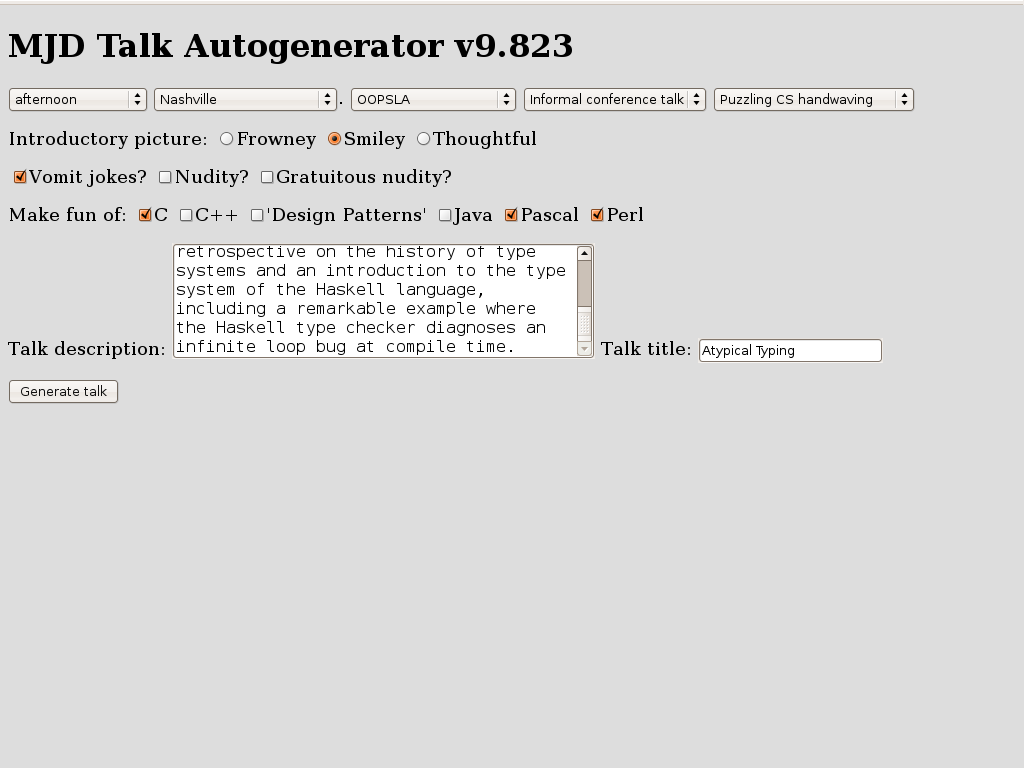Mark Dominus (陶敏修)
mjd@pobox.com

Archive:
| 2026: | J |
| 2025: | JFMAMJ |
| JASOND | |
| 2024: | JFMAMJ |
| JASOND | |
| 2023: | JFMAMJ |
| JASOND | |
| 2022: | JFMAMJ |
| JASOND | |
| 2021: | JFMAMJ |
| JASOND | |
| 2020: | JFMAMJ |
| JASOND | |
| 2019: | JFMAMJ |
| JASOND | |
| 2018: | JFMAMJ |
| JASOND | |
| 2017: | JFMAMJ |
| JASOND | |
| 2016: | JFMAMJ |
| JASOND | |
| 2015: | JFMAMJ |
| JASOND | |
| 2014: | JFMAMJ |
| JASOND | |
| 2013: | JFMAMJ |
| JASOND | |
| 2012: | JFMAMJ |
| JASOND | |
| 2011: | JFMAMJ |
| JASOND | |
| 2010: | JFMAMJ |
| JASOND | |
| 2009: | JFMAMJ |
| JASOND | |
| 2008: | JFMAMJ |
| JASOND | |
| 2007: | JFMAMJ |
| JASOND | |
| 2006: | JFMAMJ |
| JASOND | |
| 2005: | OND |
Subtopics:
| Mathematics | 245 |
| Programming | 100 |
| Language | 95 |
| Miscellaneous | 75 |
| Book | 50 |
| Tech | 49 |
| Etymology | 35 |
| Haskell | 33 |
| Oops | 30 |
| Unix | 27 |
| Cosmic Call | 25 |
| Math SE | 25 |
| Law | 22 |
| Physics | 21 |
| Perl | 17 |
| Biology | 16 |
| Brain | 15 |
| Calendar | 15 |
| Food | 15 |
Comments disabled
Mon, 03 Nov 2008
Atypical Typing
I just got back from Nashville, Tennessee, where I delivered a talk at
OOPSLA 2008, my first
talk as an "invited
speaker". This post is a bunch of highly miscellaneous notes
about the talk.
If you want to skip the notes and just read the talk, here it is.
Talk abstract
Many of the shortcomings of Java's type system were addressed by the addition of generics to Java 5.0. Java's generic types are a direct outgrowth of research into strong type systems in languages like SML and Haskell. But the powerful, expressive type systems of research languages like Haskell are capable of feats that exceed the dreams of programmers familiar only with mainstream languages.I did not say in the abstract that the talk was a retread of a talk I gave for the Perl mongers in 1999 titled "Strong Typing Doesn't Have to Suck. Nobody wants to hear that. Still, the talk underwent a major rewrite, for all the obvious reasons.In this talk I'll give a brief retrospective on the history of type systems and an introduction to the type system of the Haskell language, including a remarkable example where the Haskell type checker diagnoses an infinite loop bug at compile time.
In 1999, the claim that strong typing does not have to suck was surprising news, and particularly so to Perl Mongers. In 2008, however, this argument has been settled by Java 5, whose type system demonstrates pretty conclusively that strong typing doesn't have to suck. I am not saying that you must like it, and I am not saying that there is no room for improvement. Indeed, it's obvious that the Java 5 type system has room for improvement: if you take the SML type system of 15 years ago, and whack on it with a hammer until it's chipped and dinged all over, you get the Java 5 type system; the SML type system of the early 1990s is ipso facto an improvement. But that type system didn't suck, and neither does Java's.
So I took out the arguments about how static typing didn't have to suck, figuring that most of the OOPSLA audience was already sold on this point, and took a rather different theme: "Look, this ivory-tower geekery turned out to be important and useful, and its current incarnation may turn out to be important and useful in the same way and for the same reasons."
In 1999, I talked about Hindley-Milner type systems, and although it was far from clear at the time that mainstream languages would follow the path blazed by the HM languages, that was exactly what happened. So the HM languages, and Haskell in particular, contained some features of interest, and, had you known then how things would turn out, would have been worth looking at. But Haskell has continued to evolve, and perhaps it still is worth looking at.
Or maybe another way to put it: If the adoption of functional programming ideas into the mainstream took you by surprise, fair enough, because sometimes these things work out and sometimes they don't, and sometimes they get adopted and sometimes they don't. But if it happens again and takes you by surprise again, you're going to look like a dumbass. So start paying attention!
Haskell types are hard to explain
I spent most of the talk time running through some simple examples of Haskell's type inference algorithm, and finished with a really spectacular example that I first saw in a talk by Andrew R. Koenig at San Antonio USENIX where the type checker detects an infinite-loop bug in a sorting function at compile time. The goal of the 1999 talk was to explain enough of the ML type system that the audience would appreciate this spectacular example. The goal of the 2008 talk was the same, except I wanted to do the examples in Haskell, because Haskell is up-and-coming but ML is down-and-going.It is a lot easier to explain ML's type system than it is to explain Haskell's. Partly it's because ML is simpler to begin with, but also it's because Haskell is so general and powerful that there are very few simple examples! For example, in SML one can demonstrate:
(* SML *)
val 3 : int;
val 3.5 : real;
which everyone can understand.But in Haskell, 3 has the type (Num t) ⇒ t, and 3.5 has the type (Fractional t) ⇒ t. So you can't explain the types of literal numeric constants without first getting into type classes.
The benefit of this, of course, is that you can write 3 + 3.5 in Haskell, and it does the right thing, whereas in ML you get a type error. But it sure does make it a devil to explain.
Similarly, in SML you can demonstrate some simple monomorphic functions:
not : bool → bool real : int → real sqrt : real → real floor : real → intOf these, only not is simple in Haskell:
not :: Bool → Bool
fromInteger :: (Num a) ⇒ Integer → a -- analogous to 'real'
sqrt :: (Floating a) ⇒ a → a
floor :: (RealFrac a, Integral b) ⇒ a → b
There are very few monomorphic functions in the Haskell standard
prelude.
Slides
I'm still using the same slide-generation software I used in 1999, which makes me happy. It's a giant pile of horrible hacks, possibly the worst piece of software I've ever written. I'd like to hold it up as an example of "worse is better", but actually I think it only qualifies for "bad is good enough". I should write a blog article about this pile of hacks, just to document it for future generations.
Conference plenary sessions
This was the first "keynote session" I had been to at a conference in several years. One of the keynote speakers at a conference I attended was such a tedious, bloviating windbag that I walked out and swore I would never attend another conference plenary session. And I kept that promise until last week, when I had to attend, because now I was not only the bloviating windbag behind the lectern, but an oath-breaker to boot. This is the "shameful confession" alluded to on slide 3.
On the other hand...
One of the highest compliments I've ever received. It says "John McCarthy will be there. Mark Jason Dominus, too." Wow, I'm almost in the same paragraph with John McCarthy.McCarthy didn't actually make it, unfortunately. But I did get to meet Richard Gabriel and Gregor Kiczales. And Daniel Weinreb, although I didn't know who he was before I met him. But now I'm glad I met Daniel Weinreb. During my talk I digressed to say that anyone who is appalled by Perl's regular expression syntax should take a look at Common Lisp's format feature, which is even more appalling, in much the same way. And Weinreb, who had been sitting in the front row and taking copious notes, announced "I wrote format!".
More explaining of jokes
As I get better at giving conference talks, the online slides communicate less and less of the amusing part of the content. You might find it interesting to compare the 1999 version of this talk with the 2008 version.One joke, however, is too amusing to leave out. At the start of the talk, I pretended to have forgotten my slides. "No problem," I said. "All my talks these days are generated automatically by the computer anyway. I'll just rebuild it from scratch." I then displayed this form, which initialliy looked like this:


Wadler's anecdote
I had the chance to talk to Philip Wadler, one of the designers of Haskell and of the Java generics system, before the talk. I asked him about the history of the generics feature, and he told me the following story: At this point in the talk I repeated an anecdote that Wadler told me. After he and Odersky had done the work on generics in their gj and "Pizza" projects, Odersky was hired by Sun to write the new Java compiler. Odersky thought the generics were a good idea, so he put them into the compiler. At first the Sun folks always ran the compiler with the generics turned off. But they couldn't rip out the generics support completely, because they needed it in the compiler in order to get it to compile its own source code, which Odersky had written with generics. So Sun had to leave the feature in, and eventually they started using it, and eventually they decided they liked it. I related this story in the talk, but it didn't make it onto the slides, so I'm repeating it here.I had never been to OOPSLA, so I also asked Wadler what the OOPSLA people would want to hear about. He mentioned STM, but since I don't know anything about STM I didn't say anything about it.
View it online
The slides are online.[ Addendum 20081031: Thanks to a Max Rabkin for pointing out that Haskell's analogue of real is fromInteger. I don't know why this didn't occur to me, since I mentioned it in the talk. Oh well. ]
[Other articles in category /talk] permanent link


